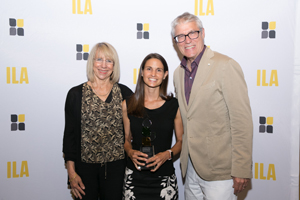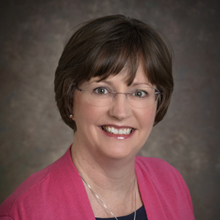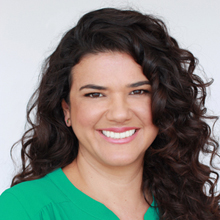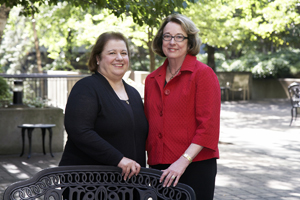Each year, ILA’s Literacy Leaders Awards ceremony and Research Awards and Grants recognize educators and researchers who go above and beyond their job descriptions and embrace their roles as agents of change.
A kindergarten teacher fosters student identity through writing workshops. A professor designs an open-access curriculum that drives achievement in low-income, historically underperforming districts. A literacy district educational specialist leads a literacy revolution in Hawaii.
Although they encompass a diverse range of backgrounds, ages, and areas of expertise, the visionary leaders on this list share a commitment to driving positive change in literacy education. Whether through research, teaching, or advocacy, they use their talents to dismantle systemic oppression, promote equity, and drive achievement—work that is central to ILA’s mission of literacy for all.
These 2018 award winners are:
 Elena E. Forzani, assistant professor in literacy education at the Boston University Wheelock College of Education and Human Development, is the recipient of the Timothy & Cynthia Shanahan Outstanding Dissertation Award, given annually for a dissertation completed in reading or literacy.
Elena E. Forzani, assistant professor in literacy education at the Boston University Wheelock College of Education and Human Development, is the recipient of the Timothy & Cynthia Shanahan Outstanding Dissertation Award, given annually for a dissertation completed in reading or literacy.
After working as a first-grade teacher for two years, Elena Forzani realized that, although she loved teaching, she was more interested in the nuts and bolts of literacy learning.
“I just loved the process of learning—not just comprehension, but actually just decoding and binding words together,” she says. Today, Forzani is a professor of literacy education at Boston University, where her research focuses on the use of digital technologies for literacy learning, specifically the comprehension of online disciplinary texts, including the critical evaluation of online information. Through her work, she seeks to understand how to design and implement assessment and instruction that targets the needs of different kinds of learners within digital contexts.
Forzani’s dissertation, “How Well Can Students Evaluate Online Science Information? Contributions of Prior Knowledge, Gender, Socioeconomic Status, and Offline Reading Ability,” explored how seventh-grade students assessed the trustworthiness of science information found online.
Forzani recalls some of the highlights of her career, most notably the opportunity to work on ORCA (Online Research and Comprehension Assessment), a five-year research project to develop valid, reliable, and practical assessments of online reading comprehension for U.S. schools, with her advisor, Donald Leu.
“That work was very meaningful to me,” she says. “It taught me a lot of things in terms of how to work on a big project with multiple people collaborating and contributing different pieces.”
When asked about her current projects, Forzani spoke about her interest in creating a tool that helps educators better understand how readers evaluate information within an online research and comprehension task, specifically for younger readers. “Many students sort of know the kinds of things they’re supposed to look for, but don’t really know how to do that well,” she says. “They seem to know what to look at and I think that’s something we can build on.”
 Sharon Walpole, professor at the School of Education at the University of Delaware, is the recipient of the Jerry Johns Outstanding Teacher Educator in Reading Award, honoring an outstanding college or university teacher of reading methods or reading-related courses.
Sharon Walpole, professor at the School of Education at the University of Delaware, is the recipient of the Jerry Johns Outstanding Teacher Educator in Reading Award, honoring an outstanding college or university teacher of reading methods or reading-related courses.
A former high school history teacher, Sharon Walpole switched to the literacy field to gain insight into her students’ reading practices.
“I wanted to understand why my students couldn’t comprehend what they were reading,” she says.
Today, Walpole is a professor in the School of Education at the University of Delaware and director of the University of Delaware’s Professional Development Center for Educators, where she works with literacy coaches, reading specialists, and administrators to build schoolwide systems to support teachers, especially those working for children at risk.
In 2016, Walpole copublished with Mike McKenna of the University of Virginia a free, open-access, elementary ELA curriculum with more than 1,100 lesson plans. Dubbed “Bookworms,” it is unique in using “real,” tangible books rather than the large collections of books and lessons plans that come only with expensive reading packages. Now in its fifth year, there is promising evidence that the curriculum improves student achievement.
When asked about her future plans, Walpole says she hopes to broaden the scope of her work to include writing instruction.
“In my center, we’re designing resources for teachers who want to deepen their understanding of writing,” she says. “We’re trying to make sure that writing isn’t a stepchild of reading.”
 Mark Conley, professor of instruction and curriculum leadership at the University of Memphis in Tennessee, is the recipient of the inaugural Leaders Inspiring Readers Award, sponsored by Achieve 3000, presented to a researcher or practitioner who has contributed significantly to advancing the knowledge base and instructional efficacy of educators in the focus area of struggling readers.
Mark Conley, professor of instruction and curriculum leadership at the University of Memphis in Tennessee, is the recipient of the inaugural Leaders Inspiring Readers Award, sponsored by Achieve 3000, presented to a researcher or practitioner who has contributed significantly to advancing the knowledge base and instructional efficacy of educators in the focus area of struggling readers.
“The thing that impressed me very early in my career was how much knowledge and skill teachers had,” he says. “And recently, I think about how much our field really needs to take advantage of that knowledge and skill.”
Conley’s extensive portfolio of research centers on teacher education policy and practice, adolescent literacy, assessment, and human and artificial intelligence tutoring. Last year, Conley took a sabbatical to work with the National Center on Education and the Economy, researching educational systems in countries that are top-performing in reading, mathematics, and science on the Program for International Student Assessment.
Recently retired, he continues to elevate teacher expertise in his community and beyond. He says his goal is to develop a physical space that’s dedicated to building teacher leadership capacity.
“Throughout my whole career, teachers have always appreciated being able to talk to each other. We want to make that easier,” he says. “Identifying the great teachers in our community and engaging them in conversations about what they know and what needs to happen—that’s my first goal.”
 Esmeralda Carini, literacy district educational specialist for the Windward District, Kailua-Kalaheo Complex Area, Hawaii Department of Education, is the recipient of the Corwin Literacy Leader Award, given annually to an administrator who has recognized the importance of building a culture of literacy within a school or district by offering literacy professional development, instructional resource support, or developing specific literacy programs to build capacity and increase student literacy achievement.
Esmeralda Carini, literacy district educational specialist for the Windward District, Kailua-Kalaheo Complex Area, Hawaii Department of Education, is the recipient of the Corwin Literacy Leader Award, given annually to an administrator who has recognized the importance of building a culture of literacy within a school or district by offering literacy professional development, instructional resource support, or developing specific literacy programs to build capacity and increase student literacy achievement.
A first-generation U.S. citizen, Esmeralda Carini learned the power of language and literacy at a young age. A former EL student, she is grateful to the teachers who helped her develop the skills for language and literacy she has today.
“I’m a big advocate that barrier in language has nothing to do with intelligence and everything to do with giving [students] the power of language. I think literacy changed my life,” she says. “I am where I am today because of my investment in my own literacy practice, and I want to give that opportunity to all kids—no matter where they grow up and what families they come from.”
Currently, Carini is the creator and facilitator of the Hawaii Lab Cohorts, which are teacher learning communities within districts and schools that offer an effective approach to professional growth, supporting schools’ efforts in growing their literacy practices. Carini continues to grow the lab across content areas, schools, and complex areas by mentoring other Lab Cohort facilitators.
When asked about her future goals, she says she hopes to continue to nurture and grow Hawaii’s burgeoning literacy community and to help design better PD and professional learning opportunities.
“If I could leave that mark on the field of education, I would be so thrilled,” she says.
 Keith Garvert, a teacher at Highline Community School, Denver, Colorado, is the recipient of the Regie Routman Teacher Recognition Grant, which honors an outstanding K–8 classroom teacher dedicated to improving and enriching the teaching and learning of purposeful reading and writing across the curriculum.
Keith Garvert, a teacher at Highline Community School, Denver, Colorado, is the recipient of the Regie Routman Teacher Recognition Grant, which honors an outstanding K–8 classroom teacher dedicated to improving and enriching the teaching and learning of purposeful reading and writing across the curriculum.
Keith Garvert remembers the exact moment that defined his teaching philosophy. He had just read Katie Wood Ray’s
About the Authors: Writing Workshop With Our Youngest Writers (Heinemann) and, riding a wave of inspiration, he decided to embrace a new method of writing workshop in his classroom.
“The following year, my whole writing workshop changed, and my first graders just blossomed into these writers. I didn’t know I could nurture that ability within them. I saw their eyes sparkle with the accomplishment of writing their first books,” he says. “That was when I learned that you have to teach kids instead of programs.”
Garvert has dedicated his career to exploring the connection between children’s identity and their performance as readers and writers. His practice is centered on sparking curiosity and learning through play.
In 2014, Garvert took a break from classroom teaching to serve as the district’s elementary literacy coordinator. When he returned to teaching at the kindergarten level last year, he says the short hiatus opened his eyes to the ways in which his lens of privilege impacts his teaching. Over the past two years, he’s been working to curate more mirrors and windows in his classroom, starting with the library.
“Winning this award, to me, means the opportunity to give back to children who haven’t had the opportunity to see themselves in literature,” he says. “I’m empowering kids to be the owners and curators of their classroom libraries.”
 Julie Coiro, associate professor of reading in the School of Education at the University of Rhode Island, is the recipient of the Erwin Zolt Digital Literacy Game Changer Award, which honors literacy game changers in online collaboration who are making an outstanding and innovative contribution to the use of technology in literacy education.
Julie Coiro, associate professor of reading in the School of Education at the University of Rhode Island, is the recipient of the Erwin Zolt Digital Literacy Game Changer Award, which honors literacy game changers in online collaboration who are making an outstanding and innovative contribution to the use of technology in literacy education.
“There’s a real danger that an entire generation of children will be unable to tell fact from fiction online,” says Julie Coiro.
A professor, researcher, writer, speaker, and advocate, Coiro seeks to examine the changing nature of technologies and how that intersects with literacy theory, students’ literacy development, reading comprehension assessment, professional development, and classroom instruction. Currently, her research focuses on developing a series of assessments to measure online reading comprehension proficiency in ways that inform classroom instruction.
Coiro has been published widely in venues such as
Reading Research Quarterly,
Journal of Literacy Research,
The Reading Teacher,
Educational Leadership, and
Journal of Adolescent & Adult Literacy. Her upcoming book,
Planning for Personal Digital Inquiry in Grades K–5 (Stenhouse), will provide a framework for how teachers might use technology to their students’ advantage in inquiry-based learning.
“Inquiry-based learning can flexibly move from teachers using technology for giving information and prompting understanding toward students actively using technology to make, assess, and act on new content,” Coiro says.
Most recently, Coiro collaborates with researchers in both the United States and Finland to develop and test learning spaces designed to facilitate productive inquiry, social deliberation, participation, and reflection. With colleague Renee Hobbs, Coiro also codirects the Summer Institute in Digital Literacy, a six-day institute focused on how literacy is changing as a result of emerging media and technologies.
The Maryann Manning Special Service Award was presented to Diane Barone, foundation professor of literacy at the University of Nevada, Reno. This award is given annually to an individual who has demonstrated a lifelong commitment of exceptional and distinguished service to the field of literacy. For this award, ILA members apply or are nominated by peers.

Diane Barone will never forget her first longitudinal study: a four-year study of literacy development in children prenatally exposed to crack/cocaine. Though this study took place more than two decades ago, it continues to motivate her day-to-day work.
“For me, that really shattered a myth that these children weren’t going to do well in school,” she says.
This finding set the precedence for Barone’s long career in literacy research, which has centered on young children, especially those in high-poverty schools, and how they develop in literacy.
In addition to teaching courses in literacy and qualitative research methods, Barone, a past president of ILA, has published articles in journals such as
Reading Research Quarterly,
The Reading Teacher, and
Journal of Literacy Research and has written several books including
Teaching Early Literacy: Development, Assessment, and Instruction (Guilford),
Narrowing the Literacy Gap: What Works in High-Poverty Schools (Guilford), and
Children’s Literature in the Classroom: Engaging Lifelong Readers (Guilford).
Today, Barone is examining how children interpret different genres and how they relate to and make meaningful connections with texts. She is also interested in media literacy as well as children’s understanding of social justice issues, specifically interpretations of power and understandings of right versus wrong.
She thanks ILA for the award.
“Because it’s attached to the name Maryann Manning, it means a lot to me; I respected her a lot,” she says. “Having an award named after her is really special.”
 Irene C. Fountas, a professor in the School of Education at Lesley University in Cambridge, MA, and Gay Su Pinnell, a professor in the School of Teaching and Learning at The Ohio State University, are the first recipients of the Diane Lapp & James Flood Professional Collaborator Award, which recognizes an ongoing professional collaboration between two or more people who regularly contribute to the professional knowledge base of literacy educators.
Irene C. Fountas, a professor in the School of Education at Lesley University in Cambridge, MA, and Gay Su Pinnell, a professor in the School of Teaching and Learning at The Ohio State University, are the first recipients of the Diane Lapp & James Flood Professional Collaborator Award, which recognizes an ongoing professional collaboration between two or more people who regularly contribute to the professional knowledge base of literacy educators.
United in their goal to equip educators with the tools to teach children with reading challenges, Irene C. Fountas and Gay Su Pinnell have coauthored dozens of books, articles, and online resources that are now considered standards in the fields of literacy instruction and staff development. Their collective portfolio includes a cohesive classroom literacy system (Fountas & Pinnell Classroom), an intervention system (Leveled Literacy Intervention), an assessment system (Benchmark Assessment System), the Fountas & Pinnell Literacy Community, and an extensive professional book base. They are currently developing
The School Leaders’ Literacy Handbook, a publication that will help school administrators create literacy opportunities for every child.
“I think we learn a lot from each other, and I think we have a lot of common perspectives around literacy and professional development,” Fountas says in a press release. “We’ve had a good friendship and a good professional relationship.”
Fountas, who studied under both Lapp and Flood (the latter passed away in 2007), says she considers them both mentors.
“To receive an award from people who played a significant role in my professional development was quite moving,” says Fountas. “They were two very brilliant and wonderful collaborators who made enormous contributions to the field.”
ILA recognized the outstanding achievements of all 2018 award winners during the ILA 2018 Conference in Austin, TX, in July. The full list of award categories and recipients can be found at
literacyworldwide.org/about-us/awards-grants, but below are some additional highlights:
Primary Fiction Book Award
Winner: The Book of Mistakes. Corinna Luyken. 2017. Dial.
Honor: Little Fox in the Forest. Stephanie Graegin. 2017. Schwartz & Wade.
Primary Nonfiction Book Award
Winner: This Is How We Do It: One Day in the Lives of Seven Kids From Around the World. Matt Lamothe. 2017. Chronicle.
Intermediate Fiction Book Award
Winner: Train I Ride. Paul Mosier. 2017. HarperCollins.
Honor: The Notations of Cooper Cameron. Jane O’Reilly. 2017. Carolrhoda.
Intermediate Nonfiction Book Award
Winner: Martí’s Song for Freedom. Emma Otheguy. 2017. Lee & Low.
Young Adult Fiction Book Award
Winner: Words on Bathroom Walls. Julia Walton. 2017. Random House.
Honor: The Hate U Give. Angie Thomas. 2017. HarperCollins.
Young Adult Nonfiction Book Award
Winner: Obsessed: A Memoir of My Life With OCD. Allison Britz. 2017. Simon & Schuster.
Constance McCullough International Research Grant
Alan Crawford, California State University, Los Angeles
Charles Temple, Hobart & William Smith Colleges, Geneva, NY
Dina Feitelson Research Award
Maren Aukerman and Lorien Chambers Schuldt, Stanford University, Stanford, CA
Elva Knight Research Grant
Laura Tortorelli, Michigan State University, East Lansing
Helen M. Robinson Grant
Jungmin Kwon, Teachers College, Columbia University, New York, NY
Jeanne S. Chall Research Fellowship
Shuling Yang, University of Nebraska–Lincoln
Steven A. Stahl Research Grant
John Strong, University of Delaware, Newark
Alina O'Donnell is the communications strategist at ILA and the editor of Literacy Daily.